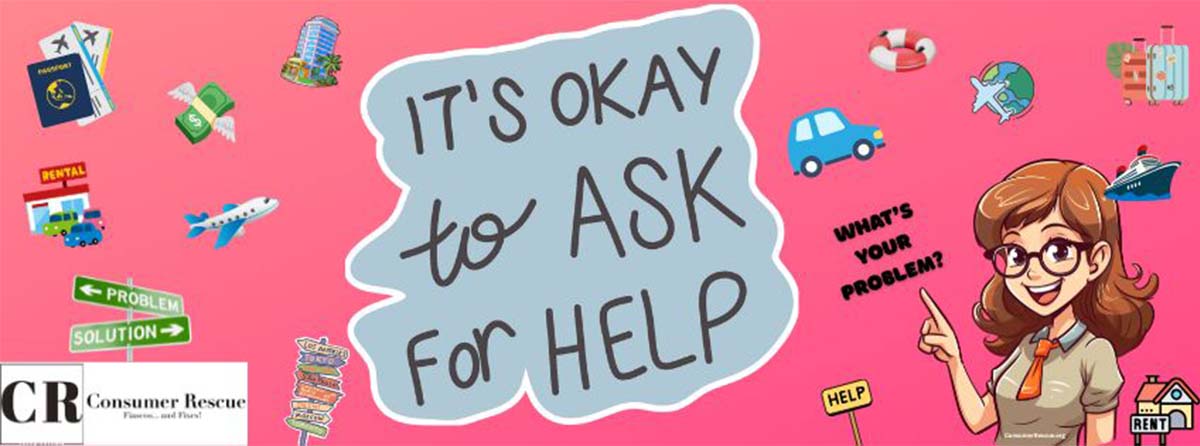Published: Updated:
Could an ombudsman columnist who routinely writes about tourist scams become the target of one herself? The answer is, of course, “Yes.” No traveler is immune to the possibility of a brush with a bad actor — not even me.
But being a target of a tourist scam and becoming a victim of one are two entirely different things. My encounter with a fraudster in Paris last week didn’t quite go the way he hoped. I’ll tell you about that in a moment.
Here are five sneaky tourist scams you should be aware of in 2026: what they look and sound like and how to avoid them.

1. Taxi scams that target tired tourists
All around the world, tourists often fall victim to taxi scams. It’s important for travelers to always remain vigilant — even in metered taxis, as you’ll soon see.
Let me tell you about the scammer I had the displeasure of meeting at Charles de Gaulle International Airport. I had arrived by train with plans to stay at a local hotel before flying home the next day. It was late in the evening and I wanted to hop in a taxi and get to the Holiday Inn.
It was a simple plan, but one that was interrupted by a taxi driver with his own devious intentions.
A colleague and her husband were traveling with me that night, and we made our way to the taxi stand. We waited in a short line and then got into an official metered taxi to take the less-than-two-mile ride. I told the driver where we were going and he said “D’accord” (okay).
While the three of us were chattering about the cruise we’d just taken and making dinner plans, I noticed something strange. We weren’t moving and the driver was quietly tapping a button on his console.
A dishonest taxi driver at Paris CDG International Airport
It was dark so the scammer was unaware that I was focused entirely on what he was doing. With each tap, the figure on the taxi’s meter went up and up.
By the time he was finished tapping the meter read €36 (approximately $42). Then the con artist posing as a legitimate taxi driver put the car in drive. He was about to take off with his hefty pre-loaded fare when I yelled “arrêt!” (stop!)
This jig was up.
I asked him why his meter had €36 on it before we had gone anywhere. He started to tell an outrageous fib about a nighttime surcharge, an explanation I rejected outright. I explained to my friends why we weren’t going with this guy. Then I called the manager of the taxi stand over to report the dishonest cabbie.
When the manager arrived at the vehicle, our driver was quickly tapping on his console again. Now the fare was going the other way until it reached just €3.60 (about $4), a reasonable nighttime surcharge. His boss told me it was all a misunderstanding, and although I knew that was a lie, I still wanted to get to the hotel. Since our luggage was already in the car, we allowed this fraudster to take us on our short ride.
That would prove to be a mistake.
One final swindling attempt by this taxi driver
As a former New Yorker, I am well acquainted with metered taxis. When we arrived at our hotel, about four minutes later, the meter had quickly risen to €12.80. I realized then that this con artist must have his meter programmed to run fast. But I was just looking forward to getting out of his car and into the hotel to enjoy dinner.
I handed him a €20 bill (about $23) and he said “Merci” and pocketed the entire thing. Now, of course, tipping taxi drivers in the United States is customary, but that is not the case in France. And a nearly 50 percent tip would be an outrageous gratuity even if it was customary to tip.
Clearing up any confusion about whether he was welcome to keep the change, I told him I had intended to tip him €2. He begrudgingly started looking for coins and then emptied his pockets to show he had no money. So I offered to pay with a credit card, and he quickly rejected that idea.
“The fare is too small to use a credit card,” he attempted to convince me.
My patience with this human being was wearing very thin. The last thing I was going to do was to allow him to force me to tip him for this awful behavior. I grabbed the €20 and went into the hotel, where the reception gave me change.
When I handed the driver his fare, I told him, “Je suis désolée, mais vous êtes un ‘scammer.’ Au revoir!” (I’m sorry, but you are a scammer. Bye!)
Then my friends and I went inside the hotel and finally enjoyed dinner. The next day when I went back to the airport, I took the free shuttle. That was something we should have done in the first place!
Related: An old-school scammer told me my husband inherited $11 million. Here’s the truth
How tourists can avoid becoming victims of a taxi scam
Theoretically, sticking with an official taxi should make you nearly immune to getting scammed. However, there are outliers. In this situation, I believe the manager was turning a blind eye to the fact that this cabbie was clearly trying to take advantage of tourists. That’s particularly disturbing.
Here’s how to protect yourself from taxi scams:
- Never accept an offer from a stranger in the terminal: In arrival terminals worldwide, you will always find random guys milling about, whispering, “Taxi?” These are not official taxi drivers, and you should never agree to take a ride with them. Tourists have reported being scammed out of hundreds of dollars after making this mistake. Some have even been threatened or found themselves locked inside the vehicle when they questioned the sky-high rate. There’s a reason they’re whispering at you in the airport — what they’re doing is illegal.
- Refuse to ride in a cab with a “broken” meter: A common scam involves a driver who tells you his meter is broken (after you get in the taxi). Should you go with someone like this, you’ll be shocked at the price of your trip at the end. Never agree to travel in a taxi that has no functioning meter.
- Keep your eye on the meter: Make sure the meter is set to zero or close to it before your cabbie puts the car in drive. But be aware that official surcharges and other fees are an actual thing that may inflate your meter slightly before your trip begins. It’s a good idea to acquaint yourself with those fees before you arrive at the taxi stand.
- Familiarize yourself with the route: Before you hop in a taxi, know where you’re going and the quickest way to get there. Let the driver know you’re familiar with the route to discourage detours designed to inflate the fare.
- Report scam drivers: Take photos of the license plate and operations certificate (usually displayed facing passengers), and report scams to the licensing organization.
2. Tourists hit with ridiculously inflated credit card charges
Last month, over at The Points Guy, I reported the outrageous story of Alan and Terry Axelrod. The Seattle-based couple contacted me after being fraudulently charged nearly $30,000 for a vegetarian meal in Buenos Aires in January.
In that bizarre case, the restaurant had reported to Chase that the Axelrods had purchased a week’s worth of “locker meat” for the eatery. Of course, that wasn’t true, but it took six months and my involvement to get the couple’s cash back.
Unfortunately, tourists are often the victims of unethical merchants abroad. These bad actors pad their bottom line by sneakily inflating the price of whatever the traveler is buying in the final credit card charge.
Related: This traveler didn’t buy $4,800 of coffee beans. Or did he?
After TPG published the Axelrods’ tale, I began to hear from other travelers with similar credit card overcharge scam stories to tell.
A $3,000 pancake breakfast in Amsterdam
Nick Day and his partner just wanted to enjoy some pancakes during their trip to Amsterdam.
📬 Subscribe to:
Tales from Consumer Advocacy Land
Real stories. Real rescues. Real advice.
Join thousands of smart travelers and savvy consumers who already subscribe to Tales from Consumer Advocacy Land — the friendly weekly newsletter from Michelle Couch-Friedman, founder of Consumer Rescue. It's filled with helpful consumer guidance, insider tips, and links to all of our latest articles.

“We went out for breakfast at a pancake house in January, 2024,” he told me. “The meal should have cost about $30.”
Day signed the receipt and left the restaurant but moments after stepping outside, Chase sent him an alert.
“The notification said I just charged $2,970 at the pancake house,” Day recalled. “It was crazy.”
But things were about to get a lot crazier.
Another lost credit card dispute but finally a win on appeal
Day turned on his heels and went right back inside the restaurant. He showed employees that they’d just charged him $3,000 for a pancake breakfast for two.
The staff claimed they couldn’t reverse the charge and handed him a phone to speak with their “boss.” The man on the line told him the only way to fix the error was to send him a wire transfer of $2,970.
The frazzled traveler only wanted the mistaken transaction voided — something that the restaurant should have easily been able to do.
But they [the employees] said it was impossible. That told Day everything he needed to know about this pancake house.
“I knew we had been targeted for this scam because we were tourists,” Day told me.
Day refused to give his banking information to the “boss” who ostensibly wanted to send a wire transfer. What followed was a weeks-long battle that included submitting photos of the receipt, the pancake menu, and a detailed letter explaining the situation.
“A few weeks later, Chase told me the restaurant confirmed the charge was legitimate,” Day reported. “I lost the credit card dispute, and the $3,000 was reapplied to my account!”
It wasn’t until Nick appealed the rejection — calling the situation “plainly ridiculous” — that Chase finally reversed the charge.
Related: The Beijing Teahouse scam: What it is and how to avoid it
How tourists can avoid rogue charges on their credit cards
It is critical that travelers familiarize themselves with the monetary system in the places they’re going — before they go there.
- Get a money conversion app: Download an app like XE.com that can give you instant conversion rates before you sign a receipt or make any purchase.
- Be careful what you sign: Never sign a receipt until you confirm the cost in your home country’s dollars. I recommend taking a photo of the receipt at the time to show what you signed, since some travelers have reported situations where merchants squeeze extra zeros onto the receipt before submitting it.
- Keep your receipts: In the case of the couple in Argentina, they failed to get a copy of their receipt. So when they filed a dispute, they had nothing to prove how much they’d agreed to pay. Always keep your receipts until you can reconcile your records at home.
- Sign up for your credit card’s instant alerts: Every major credit card company offers customers the ability to set purchase limits and allows instant notification after every purchase. This is a great way to prevent a scammer from suddenly charging thousands of dollars to your credit card.
3. Vacation rental scams
Unfortunately, a certain portion of the vacation rentals you see on the major popular listing sites is fraudulent. Understanding this basic fact will help travelers to become more savvy and review listings with a more critical eye.
Related: I wasted $2,000 on a vacation rental that doesn’t exist. Help!
However, my helpline is filled with travelers who never imagined that someone might be laying a trap on a trusted vacation rental listing site.
People like Vrbo customer Joanne May and Airbnb guest Andrea Vacca.
May was plunged into a vacation rental nightmare in London when her Vrbo rental proved to be a disgusting bait-and-switch scam. She’d paid $12,000 for what was supposed to be a luxury townhouse that she and her extended family would share. But when the group arrived, the reality was very different. In fact, the place looked more like a flophouse than a fancy British abode.
Vacca experienced a different type of vacation rental scam. The Airbnb she rented in Paris was exactly as described. However, after checkout, the unscrupulous host charged her $3,500 for a small coffee stain on a counter.
How to avoid your own vacation rental disaster
My case files at Consumer Rescue and over at The Points Guy are filled with similar vacation rental disasters.
Follow these steps to help guarantee you won’t become a victim of a vacation rental scam.
- Always stay on the platform: Many vacation rental scams begin when a consumer is lured off the official platform. Both Vrbo and Airbnb have safety measures in place to help prevent travelers from being victimized. But if you step out of that safety net, you’re on your own.
- Refuse unusual alterations: If your host wants you to go somewhere other than your original destination, refuse. Contact the platform you booked through and ask to be rebooked.
- Take photos of the property (before and after): The best way to protect against fake damage claims at your vacation rental is to thoroughly document its condition — before and after.
Related: How a Carnival cruise passenger fell for a $3,556 Zelle Scam
4. Fraudulent car rental damage claims
Expensive car rental scams are on the rise, and unfortunately, if you aren’t careful, you could easily become a victim.
Every week, without fail, I field numerous requests for help from car rental customers who have been hit with rental car repair bills for damage they claim they didn’t cause. But without proof that they returned the car undamaged, they’re often stuck.
How to avoid fraudulent car rental damage claims
It is crucial for travelers to understand that most local car rental outlets are franchised. That means they’re independently owned and operated. It also means that the owner may not share the same professionalism and ethics as the brand associated with the reservation — and many don’t.
Here’s what you should do before and after your next car rental.
- Take thorough photos and videos of the vehicle: Your absolute best defense against false damage charges are the photos you must take before and after your car rental.
- Download Consumer Rescue’s pre- and post-car rental inspection: Here’s Consumer Rescue’s free car rental inspection checklist that can help you document the condition of your rental car — before and after.
- Never leave a car rental lot with problems: If there are any problems with your rental, the smartest thing to do is reject it. Look at the vehicle, smell it, and never leave the lot if something isn’t right.
- Scrutinize the vehicle accident report (VIR): Look very carefully at the VIR report. The incorrect data in those VIR reports have allowed me to defend hundreds of consumers and reject the claims against them.
5. Scam call centers with fake customer service
The most serious threat to travelers currently is the proliferation of fake customer service centers across the Internet. I routinely receive desperate pleas from travelers who had the misfortune of accidentally dialing into one of the operations.
Related: How a $428 Southwest Airlines ticket cost a passenger $4,500
I’ve written about fake airline call centers for Consumer Rescue, Fodor’s Travel and The Points Guy in an effort to warn travelers. Unfortunately, the problem seems to be only increasing.
How to avoid falling victim to a fake airline call center
Most people victimized by a scam call center dialed into a number they found on the Internet. Tourists can easily avoid this scam by:
- Download your airline’s, cruise line’s or booking agent’s app: By doing this, you have a direct line to the official phone and chat line of your travel provider. You’ll never need to “Google” a phone number and risk reaching bad guys.
The bottom line: avoiding tourist scams
Unfortunately, I could write a 10,000-word article about tourist scams and still not be able to report them all.
Remember, becoming a target of a scam does not make you a victim. The difference between a target and a victim comes down to awareness, preparation, and a healthy dose of skepticism.
The truth is, no matter how seasoned or cautious you are, anyone can be targeted by a scammer. I’ve spent years covering these cases, and the one thing victims all have in common is that they never saw it coming.
Related: 8 car rental mistakes and scams that will wreck your wallet
Before your next trip, do a little research about your destination and learn about the common tourist scams associated with it. The U.S. State Department’s Learn About Your Destination section is a great place to start your investigation. A little caution can save you from a world of frustration and a very expensive vacation memory.
But if you do find yourself in a travel fiasco, remember: you’re not alone. Consumer Rescue is here to help make sure that scam artists, shady operators, and “helpful” fraudsters don’t get the final word. (Michelle Couch-Friedman, Chief Fiasco Fixer and founder of Consumer Rescue 🛟)




